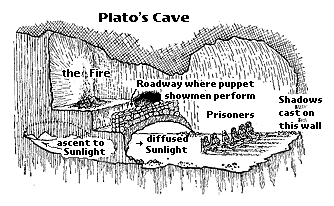Over the past few weeks, I think I have been struggling to form an opinion about defining knowledge. We have looked at so many views of different philosophers that I finally came to terms with the fact that we, as humans, may not know anything. And in this week’s reading by Pritchard, the idea of Reliabilism states, if one has a justified belief that p, if and only if the belief is the result of a reliable process. For example if p=the sky is blue, but that is a factive sense, since the sky exists and is established that it exists through our brain (a sense organ). But then it had occurred to me, what if we went off of what Descartes talked about with A Priori: the evil demon that controls our experiences under the belief that we are making our own choices. This means that our beliefs would be justified. But is this necessarily reliable then? Pritchard defines reliabilism as something that, “holds that knowledge is reliably formed true belief. The idea behind such a position was to use the reliability requirement to capture the intuition that when one has knowledge one does not merely happen upon the truth, but rather one gets to the truth in a way that normally would ensure that one has a true belief” (Pritchard 63). However, we can alter this position by discussing epistemic virtues and cognitive faculties. If we take a conscientious person to determine that the sky is blue, it will be more probable that his/her belief is true, and we trust that her eyes (used to see that the sky is blue) are properly functioning.
However this method has its problem, such as the infamous problem of chicken sexing. Data has shown that the people distinguishing the chicks on what they see and touch is false, which questions the reliability of their claims. Are they using cognitive faculties or is this like Gettier’s situation in which this is purely luck. “The conflict of intuitions in play here relates to whether you think that it is always essential that ‘internal’ factors are involved in the acquisition of bona fide knowledge, such as the agent being in the possession of good reasons for believing what she does” (Pritchard 62). Because her belief is formed based on cognitive faculties, then her epistemic virtue is flawed because the conscientious decision was made based on “blindly” sorting the chicks. “…When it comes to cases like the chicken- sexer – as regards most instances of knowledge where both cognitive faculties and epistemic virtues are involved – they will tend to produce the same verdict.” I also found it interesting that epistemic externalists note that it may be that one can have knowledge while lacking certain grounds as long as they meet the other relevant conditions. What does this all mean? I think that it is important to understand that knowledge is defined differently by different people and the grounds in which a person may have knowledge may differ.
Other sources used:
http://plato.stanford.edu/entries/reliabilism/
